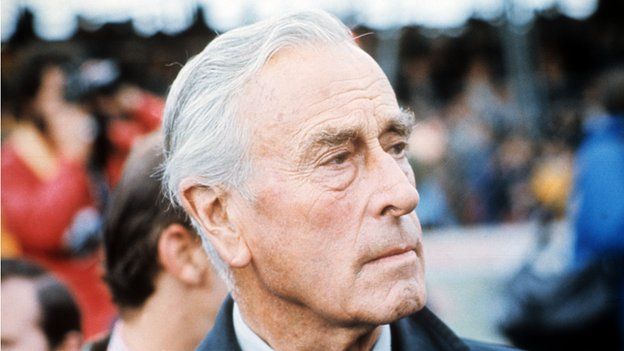Lord Mountbatten profile
- Published

During a trip to Ireland, the Prince of Wales has paid tribute to his great-uncle Lord Mountbatten and visited the place where he was killed. But who was the man Charles has described as "the grandfather I never had"?
Lord Louis Mountbatten was murdered on 27 August 1979 when the IRA detonated a bomb on his family's fishing boat in the harbour of Mullaghmore, north west Ireland.
Earl Mountbatten of Burma was not only second cousin to the Queen but his remarkable life was inextricably linked to some of the key moments of the 20th Century.
He served in two world wars, was involved in the partition of India and the Suez Crisis and died in one of the bloodiest days in Northern Ireland's Troubles.
Royal upbringing
Louis Francis Albert Victor Nicholas, Prince of Battenberg, was born in Windsor in 1900 while his great grandmother, Queen Victoria, was still on the throne.
His sister was Princess Alice of Battenberg, mother to the Duke of Edinburgh, making him Prince Charles's great uncle.
During WW1 their father changed the family name from Battenberg to Mountbatten, and he became known as Lord Louis Mountbatten.
Public life
Mountbatten joined the Royal Navy in 1916 and served at sea in World War One. This was the start of a long and illustrious naval career, which ended when he retired in 1965.
In World War Two, he commanded the destroyer HMS Kelly when it was sunk by German dive bombers off the coast of Crete with the loss of more than half the crew.
The Kelly and her captain were later immortalised in Noel Coward's film In Which We Serve.
Mountbatten was appointed chief of combined operations, preparing for the eventual invasion of occupied Europe, and was responsible for the disastrous Dieppe raid of August 1942.
It was in this role, according to historians John Keegan and Andrew Wheatcroft, that Mountbatten revealed his great talent: "He was a fixer, using diplomacy, flattery, threats and cajoling to achieve his ends."
In October 1943, Mountbatten became the supreme allied commander, South East Asia Command, with responsibilities which stretched from India and Sri Lanka to Burma, Malaya and Indo-China. In September 1945, he received the Japanese surrender at Singapore.
Once the war ended, decisions were political as much as military as local forces were reluctant to return to military rule.
In 1947 Clement Attlee persuaded Mountbatten to serve as the last viceroy of India, overseeing the British withdrawal.
The newly created Earl Mountbatten of Burma had hoped for the creation of an independent united India but on 15 August 1947 British India was partitioned into the new states of India and Pakistan, resulting in widespread inter-communal violence.
In 1950s Mountbatten returned to the navy. He was appointed first sea lord - a position his father held 40 years before - and in 1959 he became chief of the defence staff.
'Uncle Dickie'
Mountbatten had a strong influence in the upbringing of his great-nephew, the Prince of Wales.
He has been described as his godfather, but it was Mountbatten's mother - also the Prince Charles's great grandmother - who was one of the Prince's godparents.
Speaking in Ireland on Wednesday, Prince Charles described Lord Mountbatten as "the grandfather I never had."
Mountbatten and his family would spend summers at Classiebawn Castle in County Sligo.
On August bank holiday Monday 1979 the family had just set off aboard Mountbatten's boat, Shadow V, from the village of Mullaghmore, when the bomb detonated around 1130.
A witness said the blast blew the boat "to smithereens" and hurled all seven occupants into the water.
Nearby fishermen raced to the rescue and pulled Mountbatten out of the water but his legs had been almost severed by the explosion and he died shortly afterwards.
Three others died in the attack, Mountbatten's 14-year-old grandson Nicholas Knatchbull, the Dowager Lady Brabourne and 15-year-old Paul Maxwell, who was working as a boat boy.
Other survivors were pulled out of the water and rushed to hospital.
Mountbatten's funeral took place in Westminster Abbey and he was buried at Romsey Abbey, near his home at Broadlands, in Hampshire.
Since he had no sons, Mountbatten's eldest daughter, Patricia, inherited his title.